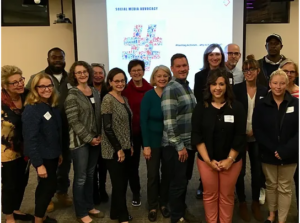Social media has become the go-to communications tool for politicians, journalists, organizations and people just like us. We can mobilize and organize around a common interest, attend events with friends, and build a network of people who share similar beliefs.
 But, are we using our personal social media to as a medium to contribute to and advance political discourse? We hosted a Social Media Advocacy 101 Training in October to highlight some of the best ways to use Facebook and Twitter to support causes most important to you, communicate with your legislators and mobilize your network.
But, are we using our personal social media to as a medium to contribute to and advance political discourse? We hosted a Social Media Advocacy 101 Training in October to highlight some of the best ways to use Facebook and Twitter to support causes most important to you, communicate with your legislators and mobilize your network.
For those of you who weren’t able to join us, here are some of the key takeaways from the training, and ways you can start using them in your personal social media use.
Twitter is the best channel for “real-time” sharing of opinions or information. When there is a vote on a bill, or a conversation that is trending, Twitter is the space to share your opinions and contribute to that dialogue rapidly. Twitter also allows you to reach a wider audience and have your voice heard by more that just your followers. This is done through the use of hashtags (e.g. #ThisIsAHashtag). Click here to learn more about hashtags.
Facebook gives you more space to share to your network. The people who see your Facebook content are primarily your Facebook friends. Create a healthy mix of content on this channel for your friends to see: share your views, pictures from vacation, interesting news articles and posts from organizations you support.
Always include media when you share content. Whether it is on Facebook or Twitter, always include a news article, photo or video to help grab people’s attention — this is especially important for advocacy material/messaging.
Tag your legislators. When tweeting your opinions regarding a particular issue or piece of legislation, make sure to tweet your legislator directly or mention them in your Facebook post. Will they look at every notification? No. Could your message make a difference? You bet.
Don’t be afraid to take risks. We live in a very tense, often unpredictable political climate right now. Each and every day, there is a new hot-button issue that deserves attention. Your voice matters. Personal stories are effective. If you are comfortable sharing, do it.
We will post more updates and tips about how to best use social media moving forward. But for right now, these are our best tips for the social media beginners.